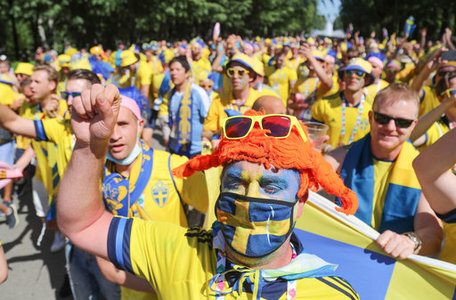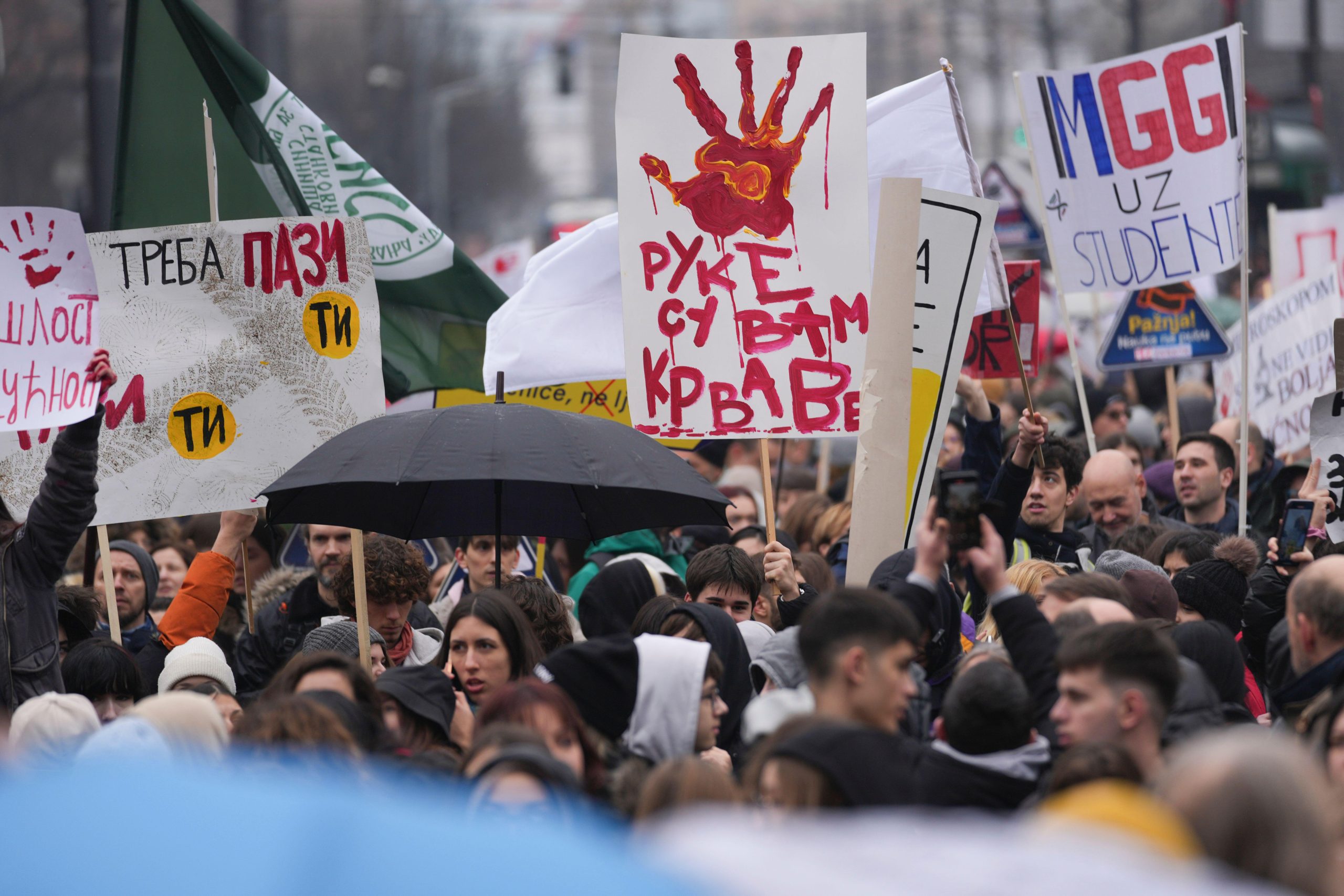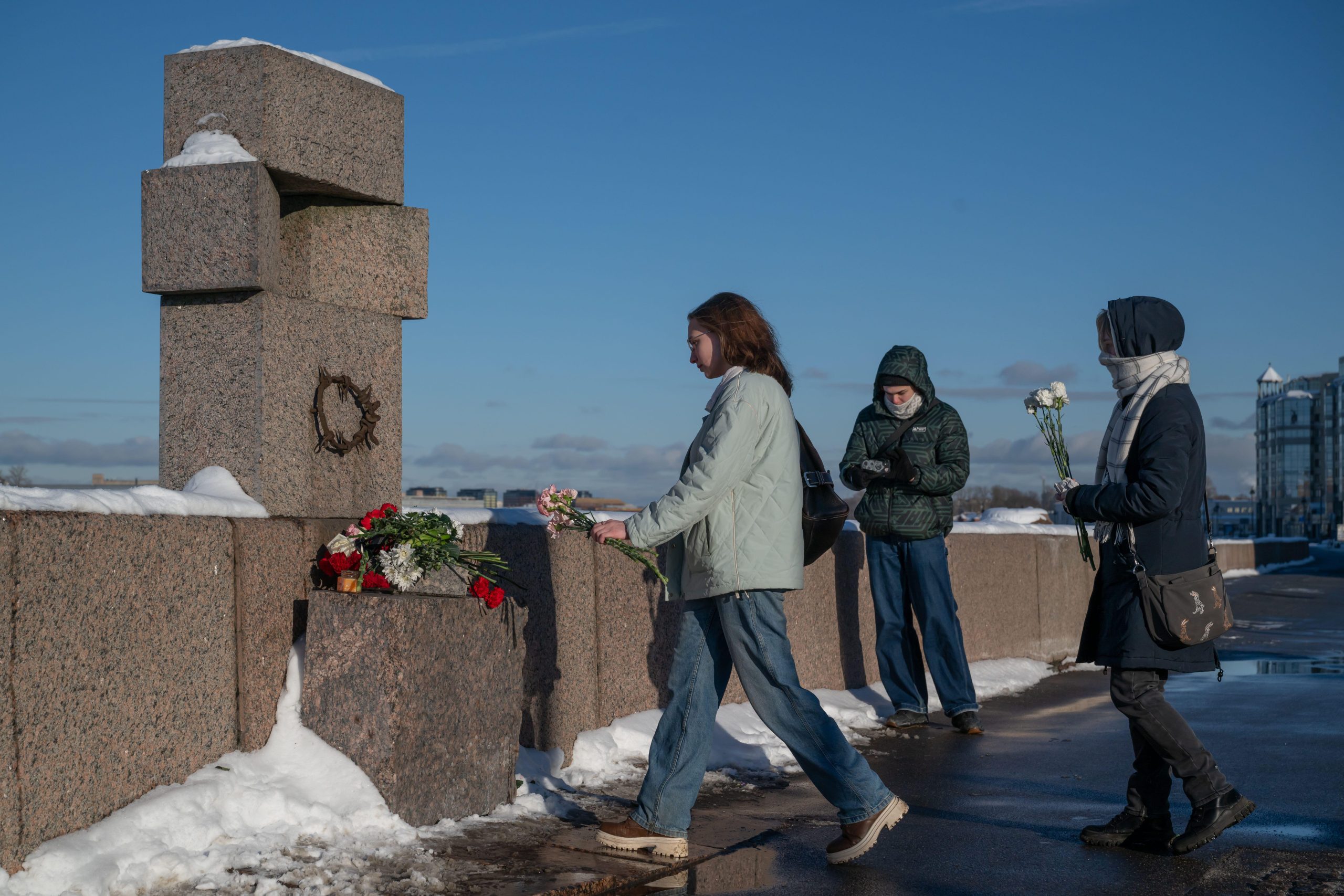[vc_row][vc_column][vc_column_text]

Sweden fans before their match with Slovakia at Euro 2020. Igor Russak/DPA/PA Images
In celebration of one of football’s biggest international tournaments, here is Index’s guide to the free speech Euros. Who comes out on top as the nation with the worst record on free speech?
It’s simple, the worst is ranked first.
We continue today with Group E, which plays the deciding matches of the group stages today.
1st Poland
Poland is divided. The recent 2020 presidential election was the smallest election victory since the end of communism in 1989. Its record on free speech is also increasingly problematic.
Incumbent president won the race to the Pałac Prezydencki with 51.2% of the vote. He is opposed to reform on LGBTQ+ rights as well as his extremely divisive abortion laws.
In January 2021, Duda’s government imposed a law that allows an abortion only in cases of rape, incest or when the mother’s life is threatened by the pregnancy. It caused country-wide protests.
Assistant professor at the Academy of Fine Arts in Warsaw, Katarzyna Kasia explained in the recent winter issue of Index’s magazine how the restrictions on abortion laws by Duda is indicative on regressive policy that threatens freedom of expression.
“I fear that Duda will continue his work as a strong supporter of the ruling nationalist coalition, obediently signing laws that will limit the power of the judiciary, freedom in academia and media, and the rights of minorities and women,” she said.
Duda has attacked the Poland’s independent media too, and thus the dissenting voices in the country have less of a platform to speak from.
This is due, in part, to the Polish state-owned oil company Orlen purchasing 20 of 24 regional newspapers previously owned by German company Polska Press. During the election there was mistrust around the media due to its German ties and accusations, therefore, that Germany was interfering in Polish politics.
All 24 of the papers have a combined readership of around 17 million people.
It is fairly clear that Orlen purchasing the papers is a deliberate attempt to change the editorial line to support Duda and consolidate support for him and his party, the Law and Justice Party (PiS). Four of the editors were recently fired, despite a court ruling by the Warsaw District Court to suspend the acquisition, pending a review.
Defamation laws also acta as a deterrent for open criticism of party officials. Under Article 212 of the criminal code, defamation is an offence that can be punished by up to two years’ imprisonment. According to Reporters Without Borders, there is “a growing tendency to criminalise defamation”.
Under Duda, the situation is unlikely to improve and there have been other attempts to control the narrative.
There is a bill supposedly designed to protect freedom of speech online and force social media companies to stop blocking content online by fining them, as well as the setting up of a “free speech council”. However, there are concerns that this will have a negative aspect on free speech and encourage disinformation online.
A changing nationalist narrative is worrying and this now extends to Poland’s role in the holocaust.
Two prominent Polish historians were forced to apologise to the niece of a former polish mayor. This, after the two had co-authored a book about Polish complicity in the holocaust.
Previously, the Polish government has attempted to criminalise any suggestion of complicity.
2nd Slovakia
Free speech in Slovakia is currently at the mercy of a hugely significant murder case.
In February 2018, journalist Ján Kuciak and his fiancé Martina Kušnírová were shot dead in their home, around 50 kilometres from the capital Bratislava.
Kuciak was heavily involved in investigating both tax fraud relating to the then ruling Slovak party Smer, as well as report examining an Italian mafia organisation. The murders caused country-wide protests.
Prime Minister Robert Fico insisted there would be an investigation, but had shown repeated showings of disdain for the media, generating what non-profit Freedom House describes as a “hateful atmosphere”. He was later forced to resign.
Two of the five original suspects were sentenced, and the retrial of influential businessman Marián Kočner in connection with the murders was ordered on 15 June. The judge ordered the retiral on the basis of “several mistakes” in the original trial that acquitted Kočner.
In a statement, the Committee to Protect Journalists (CPJ) spoke of the significance of the retrial.
“We welcome the Slovak Supreme Court’s decision to cancel the acquittals of Marián Kočner and Alena Zsuzsová and hope to see full justice in the killing of journalist Ján Kuciak and his fiancée Martina Kušnírová.”
“This ruling is a crucial step toward ending impunity in Kuciak’s killing and ensuring that all journalists can work safely and freely in Slovakia.”
Any rightful conviction of Kuciak’s murderers will surely be a positive sign for journalists working in Slovakia and symbolic of a country that holds such murders accountable to the law and deter any acts similar to this in the future.
Other journalists have also received alarming threats. In June 2020, journalist for online news site Aktuality.sk, Peter Sabo, received a pistol cartridge in his mailbox.
Independent media in Slovakia is lacking. Much of the country’s news outlets are owned by a select few and there are also concerns over the impartiality of the public broadcaster Radio and Television of Slovakia after a number of its staff were sacked in 2018.
3rd Spain
The far-right is on the rise in Spain. Populist party VOX have been relatively successful in helping to create an atmosphere where journalists are being targeted.
In 2020, protests against the government’s handling of the coronavirus crisis and VOX supporters were heard shouting abuse at Spanish reporters.
During the pandemic, controversy arose over the Spanish governments attempt to control the questions given in press conferences by ordering journalists to send questions into the press secretary beforehand. In response, over 400 Spanish journalists were forced to sign an open letter asking the government to reconsider.
The information released by the government during the pandemic was also problematic. Data journalists found that the information released by the governments was overly confusing. As the CPJ reported, one journalist explained why this was a problem: “In Spain, the government sometimes releases data on the number of people who have tested positive on viral tests, while at other times it also includes the number who have tested positive on antibody tests.”
“Other reports contain different figures, such as the number of asymptomatic cases. The constant changes “hinder good analysis and projections,” he said. To complicate things further, national and local data sets often do not add up with national authorities reporting far fewer deaths from the virus than the total number reported by local authorities.”
There have been several notable attacks in the past few years.
Police have been criticised for being heavy-handed during protests. During the demonstration for Catalonian independence in October 19, there were numerous incidents of journalists being targeted by police and protesters.
Police detained El País reporter Albert Garcia after he documented the arrest of a protester, while French journalist Elize Gazendgel reported two separate occasions where she “received blows” from police. Both were wearing the correct, identifiable media accreditation.
Earlier the same month, a particularly appalling incident took place when Laila Jiménez of Telenico TV, was repeatedly pushed and subjected to abuse, as well as having vodka poured over her head.
Despite protests being of vital importance to upholding free speech in a democracy, the Spanish Citizen Security Law (also known as the “gag law”) puts bureaucratic barriers in the way of organising a protest, where authorities must be informed beforehand. Sharing images of police officers that may “endanger” them is also prohibited.
Laws such as this have come under further scrutiny after the case of Spanish rapper Pablo Hasél earlier this year.
Hasél has been jailed for his lyrics, which are crass at best and he has rapped about a “noose for the king”. But Spanish law deems these words illegal.
His arrest sparked widespread protests, particularly among Spanish youths. In response, the government has promised a review in to Spanish free speech laws.
4th Sweden
Sweden’s record on free speech is encouraging and were the first country in the world to adopt a press freedom law, they also have a media ombudsman to deal with ethical issues.
However, one damaging defamation case could set an alarming precedent, concerning the finance publication Realtid.
The case has seen Monaco-based Swedish businessman Svante Kumlin use a vexatious defamation lawsuit against Realid after they began to investigate his company Eco Energy World.’
The lawsuit is also known as a Strategic Lawsuit Against Public Participation (Slapp) and are used by governments or large corporations to saddle a journalist (or anyone publishing allegedly defamatory claims) with long term court cases and legal costs.
The case is awaiting a judgement from to see if it can be tried in England and Wales, where defamation laws are not constitutionally protected.
In December, Index, along with free expression groups RSF, Article 19 and Defence and European Centre for Press and Media Freedom (ECPMF) expressed their concern over the matter.
The letter read “Realtid is being sued by Svante Kumlin, a Swedish businessman, domiciled in Monaco. Realtid had been investigating Kumlin’s group of companies, Eco Energy World (EEW), ahead of an impending stock market launch in Norway, a matter of clear public interest. The investigation began in September when Realtid’s reporters wrote about another stock market launch and discovered off-market sales of shares in EEW.”
While Swedish journalists report in a relatively safe environment, there have been threats towards journalists foreign or exiled reporters in recent years. Turkish journalist Turkish journalist Abdullah Bozkurt was beaten by three men in Stockholm in September 2020 in an incident that was believed to be a threat to exiled Turkish journalists working abroad.
Critic of the authorities in the Chechen region of Russia, Tumso Abdurakhmanov was assaulted by two individuals in his hometown of Gävle, Sweden in February 2020.
Other groups
Group D[/vc_column_text][/vc_column][/vc_row][vc_row][vc_column][three_column_post title=”You may also like to read” category_id=”8996″][/vc_column][/vc_row]





